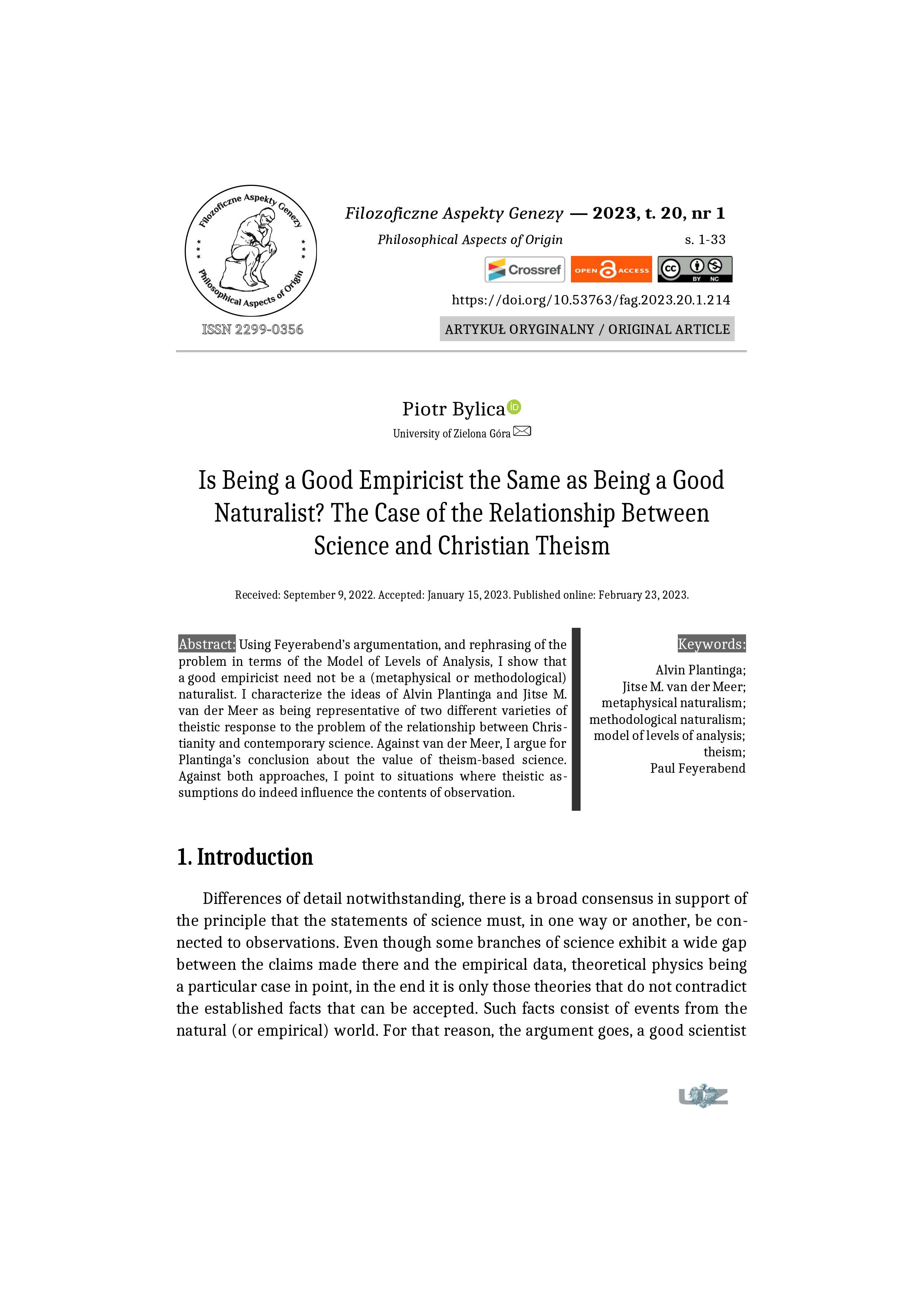Is Being a Good Empiricist the Same as Being a Good Naturalist? The Case of the Relationship Between Science and Christian Theism

Opublikowane 23.02.2023
Wersje
- 14.09.2023 - (2)
- 23.02.2023 - (1)
Słowa kluczowe
- Alvin Plantinga,
- Jitse M. van der Meer,
- metaphysical naturalism,
- methodological naturalism,
- model of levels of analysis
- theism,
- Paul Feyerabend ...More
Prawa autorskie (c) 2023 Filozoficzne Aspekty Genezy

Utwór dostępny jest na licencji Creative Commons Uznanie autorstwa – Użycie niekomercyjne 4.0 Międzynarodowe.
Jak cytować
Abstrakt
Using Feyerabend’s argumentation, and rephrasing of the problem in terms of the Model of Levels of Analysis, I show that a good empiricist need not be a (metaphysical or methodological) naturalist. I characterize the ideas of Alvin Plantinga and Jitse M. van der Meer as being representative of two different varieties of theistic response to the problem of the relationship between Christianity and contemporary science. Against van der Meer, I argue for Plantinga’s conclusion about the value of theism-based science. Against both approaches, I point to situations where theistic assumptions do indeed influence the contents of observation.
Downloads
Bibliografia
- Bartlett Jonathan and Holloway Eric, Other Non-Naturalistic Methodologies in Modern Practice, in: Jonathan Bartlett and Eric Holloway (eds.), Naturalism and Its Alternatives in Scientific Methodologies: Proceedings of the 2016 Conference on Alternatives to Methodological Naturalism, Blyth Institute Press, Broken Arrow, Oklahoma 2017, pp. 257–268.
- Bartlett Jonathan, Philosophical Shortcomings of Methodological Naturalism and the Path Forward, in: Jonathan Bartlett and Eric Holloway (eds.), Naturalism and Its Alternatives in Scientific Methodologies: Proceedings of the 2016 Conference on Alternatives to Methodological Naturalism, Blyth Institute Press, Broken Arrow, Oklahoma 2017, pp. 13–37.
- Brand Leonard, Naturalism: Its Role in Science, Origins 2015, No. 64, pp. 21–37.
- Bylica Piotr, Levels of Analysis in Philosophy, Religion, and Science, Zygon: Journal of Religion and Science 2015, Vol. 50, No. 2, pp. 304–328, https://doi.org/10.1111/zygo.12179.
- Bylica Piotr, Mark Harris as a Naturalistic Theist: The Perspective of the Model of Levels of Analysis, Filozoficzne Aspekty Genezy 2015, t. 12, pp. 7–36, https://doi.org/10.53763/fag.2015.12.109.
- Bylica Piotr, Naturalistic Theism on General Divine Action within the Framework of the Levels of Analysis Model, Studia Philosophiae Christianae 2016, Vol. 52, No. 4, pp. 7–37, https://doi.org/10.21697/2016.52.4.11.
- Bylica Piotr, Naturalistic Theism on Special Divine Action within the Tramework of the Model of Levels of Analysis, Studia Philosophiae Christianae 2017, Vol. 53, No. 1, pp. 5–33, https://doi.org/10.21697/2017.53.1.01.
- Bylica Piotr, Regularity Statements in Science and Religion, in: Michael Fuller, Dirk Evers, Anne Runehov, Knut-Willy Sæther, and Bernard Michollet (eds.), Nature and Beyond: Transcendence and Immanence in Science and Religion, Studies in Science & Theology, Vol. 17, Essat, Martin-Luther-University, Halle-Wittenberg 2020, pp. 237–249.
- Bylica Piotr, Second Thoughts on Naturalistic Theism and the Model of Levels of Analysis: A Response to Mark Harris, Filozoficzne Aspekty Genezy 2016, t. 13, pp. 275–285, https://doi.org/10.53763/fag.2016.13.134.
- Bylica Piotr, Współczesny teizm naturalistyczny z punktu widzenia modelu poziomów analizy: Problem działania sfery nadnaturalnej w przyrodzie, Biblioteka Filozoficznych Aspektów Genezy, t. 7, Instytut Filozofii Uniwersytetu Zielonogórskiego, Zielona Góra 2016.
- Feyerabend Paul, Against Method: Outline of an Anarchistic Theory of Knowledge, 1st edition, New Left Books, London 1975.
- Feyerabend Paul, Against Method: Outline of an Anarchistic Theory of Knowledge, in: Michael Radner and Stephen Winokur (eds.), Analyses of Theories and Methods of Physics and Psychology, Minnesota Studies in the Philosophy of Science, Vol. 4, Minneapolis, University of Minnesota Press, 1970, pp. 17–130.
- Feyerabend Paul, How to Be a Good Empiricist: a Plea for Tolerance in Matters Epistemological, in: Paul Feyerabend, Knowledge, Science and Relativism, Philosophical Papers, Volume 3, John Preston (ed.), Cambridge University Press, Cambridge 1999, pp. 78–103.
- Feyerabend Paul, Three Dialogues on Knowledge, Blackwell, Oxford — Cambridge 1991.
- Gordon Bruce L., In Defense of Uniformitarianism, Perspectives on Science and Christian Faith 2013, Vol. 65, No. 2, pp. 79–86).
- Jodkowski Kazimierz, Epistemiczne układy odniesienia i »warunek Jodkowskiego«, in: Anna Latawiec and Grzegorz Bugajak (eds.), Filozoficzne i naukowo-przyrodnicze elementy obrazu świata, t. 7, Wydawnictwo Uniwersytetu Kardynała Stefana Wyszyńskiego, Warszawa 2008, pp. 108–123.
- Jodkowski Kazimierz, Epistemiczny układ odniesienia teorii inteligentnego projektu, Filozofia Nauki 2006, t. 14, nr 1, pp. 95–105.
- Jodkowski Kazimierz, Filozofia nauki Paula K. Feyerabenda. Studium umiarkowane, Studia Filozoficzne 1979, nr 11, pp. 59–75.
- Jodkowski Kazimierz, Uczony w ciemnym budynku. Na marginesie metafory Elżbiety Kałuszyńskiej, in: Józef Dębowski and Ewa Starzyńska-Kościuszko (eds.), Nauka, racjonalność, realizm: Między filozofią przyrody a filozofią nauki i socjologią wiedzy, Instytut Filozofii Uniwersytetu Warmińsko-Mazurskiego, Olsztyn 2013, pp. 55–67.
- Johnson Phillip E., Reason in the Balance: The Case Against Naturalism in Science, Law & Education, InterVarsity Press, Downers Grove 1995, pp. 48–50, 107.
- Kilian Krzysztof J., Argumenty na rzecz naturalizmu jako epistemicznego układu odniesienia, Filozoficzne Aspekty Genezy 2018, t. 15, pp. 1–63, https://doi.org/10.53763/fag.2018.15.149.
- Kilian Krzysztof J., Argumenty przeciwko naturalizmowi jako epistemicznemu układowi odniesienia, Filozoficzne Aspekty Genezy 2018, t. 15, pp. 71–137, https://doi.org/10.53763/fag.2018.15.150.
- Kilian Krzysztof J., Poglądy filozoficzne Paula K. Feyerabenda: Cz. 1: Program metodologiczny, cz. I, Oficyna Wydawnicza Uniwersytetu Zielonogórskiego, Zielona Góra 2014.
- Kilian Krzysztof J., Współczesne epistemiczne układy odniesienia w nauce, Biblioteka Filozoficznych Aspektów Genezy, t. 9, Oficyna Wydawnicza Uniwersytetu Zielonogórskiego, Zielona Góra 2021.
- Knight Christopher C., Divine Action: A Neo-Byzantine Model, International Journal for Philosophy of Religion 2005, Vol. 58, pp. 181–199.
- Knight Christopher C., Theistic Naturalism and Special Divine Providence, Zygon 2009, Vol. 44, No. 3, pp. 533–542.
- Lewis Clive S., Miracles: A Preliminary Study, Collins, Glasgow 1977, p. 7.
- O’Connor Robert C., Science on Trial: Exploring the Rationality of Methodological Naturalism, Perspectives on Science and Christian Faith 1997, Vol. 49, No. 1, pp. 15–31.
- Peacocke Arthur, Paths from Science towards God: The End of All Our Exploring, One World, Oxford 2001, p. 138.
- Plantinga Alvin, Methodological Naturalism?, in: Jitse M. van der Meer (ed.), Facets of Faith and Science: Volume 1: Historiography and Modes of Interaction, The Pascal Centre for Advanced Studies in Faith and Science & University Press of America, Lanham — New York — London 1996, pp. 177–221.
- Sagan Dariusz, Status poznawczy teorii inteligentnego projektu w świetle naturalizmu metodologicznego i koncepcji epistemicznych układów odniesienia, in: Stanisław Janeczek, Zbigniew Wróblewski, and Anna Starościc (eds.), Genius Vitae. Księga pamiątkowa dedykowana Panu Profesorowi Marianowi Józefowi Wnukowi, Katolicki Uniwersytet Lubelski Jana Pawła II, Lublin 2019, pp. 309–321.
- Smith Tiddy, Methodological Naturalism and Its Misconceptions, International Journal for Philosophy of Religion 2017, Vol. 82, No. 3, pp. 321–336, https://doi.org/10.1007/s11153-017-9616-3.
- van der Meer Jitse M., Background Beliefs, Ideology, and Science, Perspectives on Science and Christian Faith 2013, Vol. 65, No. 2, pp. 87–103.
- Van Till Howard J., Are Bacterial Flagella Intelligently Designed? Reflection on the Rhetoric of the Modern ID Movement, Science and Christian Belief 2003, Vol. 15, No. 2, pp. 117–140.
- Zargar Zahra, Azadegan Ebrahim, and Nabavi Lotfollah, Should Methodological Naturalists Commit to Metaphysical Naturalism?, Journal for General Philosophy of Science 2020, Vol. 51, No. 1, pp. 185–193, https://doi.org/10.1007/s10838-019-09464-8.
- Życiński Józef, Bóg i ewolucja. Podstawowe pytania ewolucjonizmu chrześcijańskiego, Prace Wydziału Filozoficznego, t. 89, Wydawnictwo TN KUL, Lublin 2002, p. 70.


